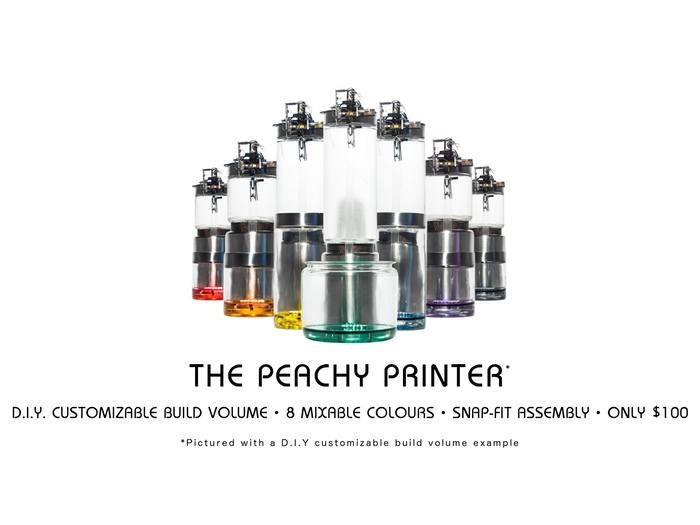
Things aren’t so peachy for 3-D printer company the Peachy Printer.
Creators of the 3-D printer promised to deliver it for $100 (Canadian dollars) to Kickstarter backers by March 2014. The Peachy Printer raised $651,091 (Canadian) on Kickstarter. Backers never received their 3-D printers, and funds haven’t been returned to them.
The reason, says Rylan Grayston, one of the creators of the 3-D printer and the CEO of the Peachy Printer, is that his fellow co-founder David Boe allegedly stole $324,716 (Canadian) to build himself a house.
How did things go so horribly wrong? Let’s back up to the beginning to figure it out. Boe and Grayston launched a Kickstarter campaign on September 20, 2013, for the Peachy Printer -- which they billed as “the world’s first $100 3-D printer.” The campaign raised $651,091 (Canadian) from 4,420 backers in 30 days. On Nov. 6, 2013, the duo established Peachy Printer, Inc. By then, the Kickstarter campaign had ended. Both Boe and Grayston held equal shares in the company at the time of incorporation.
Because the Kickstarter campaign ended before the incorporation of Peachy Printer, a corporate bank account did not exist. So, Boe’s personal bank account received the Kickstarter funds, and he promised to hold them until the creation of a company account. At the advice of their bank manager, Boe “moved the money in smaller chunks to avoid having our funds tied up if something were to go wrong with the transfer,” as Grayston details on the company’s website.
Boe initially transferred $200,000 (Canadian) “to cover initial operating expenses.” Boe was to transfer the remainder of the funds from his personal account to the corporate account, but it never happened. By March 5, 2014, “He had spent every penny,” Grayston said.
Grayston soon became suspicious of Boe, according to his account on the company’s website. He asked his lawyers to draw up an agreement that included Boe admitting to misappropriating funds, agreeing to repay back the funds in full, and distributing his shares back to the company. Boe signed the agreement, which is posted on Peachy Printer’s website.
Boe even filmed a video where he “took responsibility for his actions and apologized to our backers,” Grayston said. The videos are posted on Kickstarter, in Grayston’s letter to backers. In that letter, Grayston appeals to backers to contact the police in the Saskatoon area where he lives. “The police would like to hear from you,” the letter states. “They have asked me if there are any backers that they can talk to.”
So, where do things now stand? Grayston admits in the letter that the company is “broke,” and wasn’t able to “pay rent at the house/headquarters this month.” He details all that he has done to “reduce costs” since finding out Boe stole the funds, and that includes taking an “immediate pay cut” and laying off all employees except his brother, who also took a pay cut. He also moved Peachy’s headquarters from a commercial space into his own house. His brother covered thousands of dollars of “company-related expenses” from his personal savings account “without reimbursement,” Grayston said.
The Peachy Printer is not the only crowdfunding project that has failed to deliver the promised product to backers. Last year, the U.S. Federal Trade Commission (FTC) took legal action against Erik Chevalier who asked people to back his board game, The Doom That Came to Atlantic City, through a Kickstarter campaign. He failed to provide backers with the promised board game and never returned their funds. The FTC settled its case against him, and as part of the settlement Chevalier is prohibited from “making misrepresentations about any crowdfunding campaign and from failing to honor stated refund policies.” However, the $111,793 judgment imposed on Chevalier is suspended because he is unable to pay. In other words, his Kickstarter campaign backers are left without refunds.
Only 9 percent of all Kickstarter campaigns fail to deliver the promised rewards, a University of Pennsylvania study found. The study also found that 8 percent of dollars pledged went to failed projects, and 7 percent of backers failed to receive their chosen reward. Still, campaigns that fail to deliver what they promise can make some people nervous about supporting any crowdfunding campaigns.
There are several ways that consumers can protect themselves, as Consumer Reports suggests. One way is to take a look at a campaign creator’s business background. See if they have have successfully launched other projects and have an online profile with information about their expertise in the area for which they are seeking funds. See also if they have attempted to fund the same project on multiple crowdfunding sites. As Consumer Reports says, “That could show an attempt to raise as much money from as many as people as possible.”
Image credit: Kickstarter

Gina-Marie is a freelance writer and journalist armed with a degree in journalism, and a passion for social justice, including the environment and sustainability. She writes for various websites, and has made the 75+ Environmentalists to Follow list by Mashable.com.














